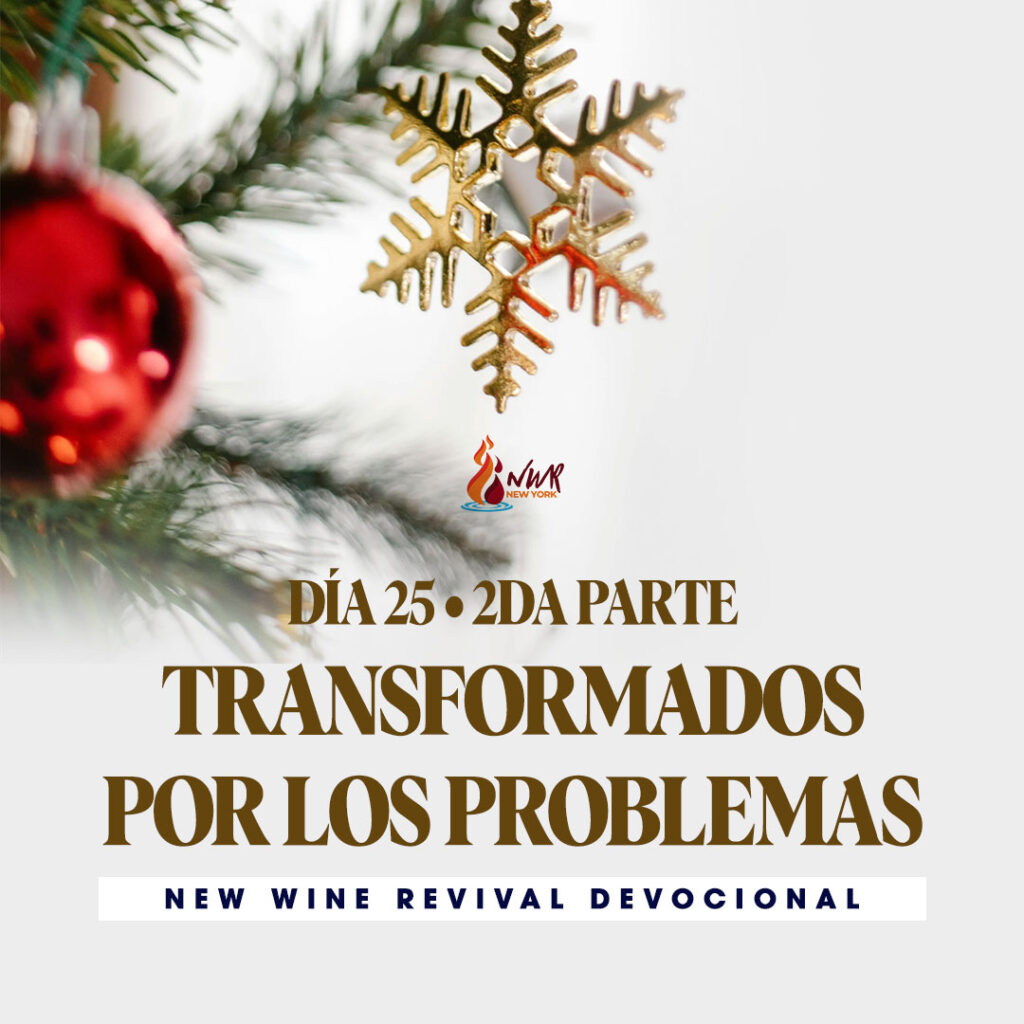
En este mundo afrontarán aflicciones, pero ¡anímense! Yo he vencido al mundo.
JUAN 16:33 (NVI)
Cómo entender romanos 8:28-29 Este es uno de los pasajes bíblicos más mal citados y mal entendidos de la Biblia. No dice: «Dios hace que todo suceda como yo quiero». Obviamente eso no es cierto. Tampoco dice: «Dios hace que todo suceda para tener un final feliz sobre la tierra». Eso tampoco sería verdad. Hay muchos finales infelices sobre la tierra.
Vivimos en un mundo caído. Solo en el cielo se hace todo perfectamente como Dios quiere. Por eso se nos dice que oremos: «Hágase tu voluntad en la tierra como en el cielo». Para entender cabalmente Romanos 8:28-29 debes considerar frase por frase.
«Sabemos»: Nuestra esperanza en los tiempos difíciles no se basa en el pensamiento positivo, la expresión de buenos deseos o un optimismo natural. Es una certeza basada en las verdades siguientes: Dios tiene el control completo de nuestro universo y nos ama.
«… que Dios dispone…»: Hay un Gran Diseñador detrás de todo. Tu vida no es el resultado de una opción aleatoria, el destino o la suerte. Hay un plan maestro. La historia es su historia. Dios ejerce su influencia. Nosotros cometemos errores, pero él nunca yerra. Dios no puede equivocarse porque es Dios.
«… todas las cosas…»: El plan de Dios para tu vida involucra todo lo que te pasa, incluyendo tus errores, pecados y heridas. La enfermedad, las deudas, los desastres, el divorcio y la muerte de los seres queridos. Dios puede producir algo bueno del peor mal. Ya lo hizo en el Calvario.
«… para…»: No separada o independientemente. Los acontecimientos de tu vida obran juntos en el plan de Dios. No son actos aislados, sino partes interdependientes del proceso para hacerte como Cristo. A fin de hacer un pastel usas harina, sal, huevos crudos, azúcar y aceite. Si se comen por separado, cada ingrediente es bastante desagradable o incluso amargo. Pero al cocinarlos juntos se vuelven deliciosos. Si pones en las manos de Dios todas tus experiencias, tristes y desagradables, él las mezclará para el bien.
«… el bien…»: Esto no dice que todo en la vida sea bueno. Mucho de lo que pasa en nuestro mundo es vil y malo, pero Dios se especializa en producir algo bueno de todo lo que sucede. En el árbol genealógico oficial de Jesucristo figuran cuatro mujeres en la lista: Tamar, Rahab, Rut y Betsabé. Tamar sedujo a su suegro para quedar embarazada. Rahab era una prostituta. Rut ni siquiera era judía y quebrantó la ley casándose con un hombre judío. Betsabé cometió adulterio con David, que resultó ser el asesino de su marido. Estas mujeres no se destacaban precisamente por su buena reputación, pero Dios produjo lo bueno de lo que era malo, y Jesús vino de ese linaje. El propósito de Dios está por encima de nuestros problemas, nuestro dolor o incluso nuestro pecado.
«… de quienes lo aman [a Dios], los que han sido llamados…»: Esta promesa es solo para los hijos de Dios. No es para todos. Todas las cosas obran para el mal de los que viven oponiéndose a Dios e insisten en hacer lo que quieren.
«… de acuerdo con su propósito…»: ¿Cuál es ese propósito? Que seamos «la imagen de su Hijo». ¡Todo lo que Dios permite que pase en tu vida, tiene el objetivo de cumplir con ese propósito!
Cómo forjar un carácter semejante al de Cristo.
Somos como joyas talladas con el martillo y el cincel de la adversidad. Si el martillo de un joyero no tiene la fuerza suficiente para limar nuestras asperezas, Dios usará un mazo. Si realmente somos tercos, utilizará un taladro. Empleará cualquier cosa que tenga que usar.
Todos los problemas son una oportunidad para forjar el carácter, y cuanto más difícil sea, mayor será el potencial para construir el músculo espiritual y la fibra moral. Pablo dijo: «Sabemos que el sufrimiento produce perseverancia; la perseverancia, entereza de carácter». Lo que pasa fuera de tu vida no es tan importante como lo que sucede dentro. Las circunstancias son temporales, pero tu carácter durará para siempre.
Reflection:
Lo que pasa fuera de tu vida no es tan importante como lo que sucede dentro.
Transformed by Trouble – 2nd Part
Jesus said, “In this world you will have trouble. But take heart! I have overcome the world.”
JOHN 16:33 (NIV)
Understanding Romans 8:28 – 29 This is one of the most misquoted and misunderstood passages in the Bible. It doesn’t say, “God causes everything to work out the way I want it to.” Obviously that’s not true. It also doesn’t say, “God causes everything to work out to have a happy ending on earth.” That is not true either. There are many unhappy endings on earth. We live in a fallen world. Only in heaven is everything done perfectly the way God intends. That is why we are told to pray, “Thy will be done in earth, as it is in heaven.” To fully understand Romans 8:28 — 29 you must consider it phrase by phrase.
“We know”: Our hope in difficult times is not based on positive thinking, wishful thinking, or natural optimism. It is a certainty based on the truths that God is in complete control of our universe and that he loves us.
“that God causes”: There’s a Grand Designer behind everything. Your life is not a result of random chance, fate, or luck. There is a master plan. History is His story. God is pulling the strings. We make mistakes, but God never does. God cannot make a mistake — because he is God.
“everything”: God’s plan for your life involves all that happens to you — including your mistakes, your sins, and your hurts. It includes illness, debt, disasters, divorce, and death of loved ones. God can bring good out of the worst evil. He did at Calvary.
“to work together”: Not separately or independently. The events in your life work together in God’s plan. They are not isolated acts, but interdependent parts of the process to make you like Christ. To bake a cake you must use flour, salt, raw eggs, sugar, and oil. Eaten individually, each is pretty distasteful or even bitter. But bake them together and they become delicious. If you will give God all your distasteful, unpleasant experiences, he will blend them together for good.
“for the good”: This does not say that everything in life is good. Much of what happens in our world is evil and bad, but God specializes in bringing good out of it. In the official family tree of Jesus Christ, four women are listed: Tamar, Rahab, Ruth, and Bathsheba. Tamar seduced her father-in-law to get pregnant. Rahab was a prostitute. Ruth was not even Jewish and broke the law by marrying a Jewish man. Bathsheba committed adultery with David, which resulted in her husband’s murder. These were not exactly sterling reputations, but God brought good out of bad, and Jesus came through their lineage. God’s purpose is greater than our problems, our pain, and even our sin.
“of those who love God and are called”: This promise is only for God’s children. It is not for everyone. All things work for bad for those living in opposition to God who insist on having their own way.
“according to his purpose”: What is that purpose? It is that we “become like his Son.” Everything God allows to happen in your life is permitted for that purpose!
Building Christlike Character.
We are like jewels, shaped with the hammer and chisel of adversity. If a jeweler’s hammer isn’t strong enough to chip off our rough edges, God will use a sledgehammer. If we’re really stubborn, he uses a jackhammer. He will use whatever it takes.
Every problem is a character-building opportunity, and the more difficult it is, the greater the potential for building spiritual muscle and moral fiber. Paul said, “We know that these troubles produce patience. And patience produces character.” What happens outwardly in your life is not as important as what happens inside you. Your circumstances are temporary, but your character will last forever.
Reflection:
What happens outwardly in your life is not as important as what happens inside you.



